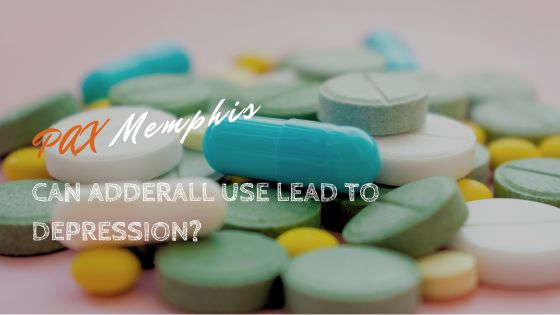Adderall is a prescription stimulant medication used to treat attention-deficit hyperactivity disorder (ADHD) and narcolepsy. It contains two active ingredients: amphetamine and dextroamphetamine.[1]
By increasing levels of norepinephrine and dopamine in the brain, Adderall can improve focus, attention, and impulse control in people with ADHD. However, these effects can lead to abuse and addiction among people without the condition. Due to it’s potential for addiction, Adderall is considered a Schedule II drug.
Many people who take Adderall (by prescription or not) struggle with depression. If you consume Adderall regularly and deal with depression, you might be wondering if it is causing your symptoms. Unfortunately, Adderall can lead to depression, especially if you are physically dependent on it.
What are the Side Effects of Adderall?
Like any medication, Adderall may cause side effects. Adderall is a central nervous system stimulant that causes feelings of irritability, increased energy, and even a decreased appetite.
Common side effects of Adderall include:[1]
- Diarrhea
- Dizziness
- Dry mouth
- Headaches
- Fever
- Loss of appetite
- Insomnia
- Mood swings
- Nausea and stomach aches
These are side effects that can occur when you are taking Adderall as prescribed. If you are abusing Adderall, you might experience different side effects or more severe versions of the common effects. For example, people abusing Adderall often have severe insomnia and struggle with weight loss from a loss of appetite over time.
Can Adderall Use Cause Depression?
Adderall use can cause depression, especially when you are abusing it. When you abuse Adderall your brain gets accustomed to the presence of the substance, and your brain is used to extremely high levels of norepinephrine and dopamine.
If you suddenly stop taking Adderall, your levels of norepinephrine and dopamine will suddenly drop, resulting in withdrawal. During withdrawal, you might feel extremely depressed because dopamine is a chemical that is responsible for feelings of pleasure and reward.
Oftentimes, the phenomenon of feeling depressed after suddenly stopping Adderall use is known as a “crash”. Adderall crashes are often the symptoms of withdrawal, which occur once you are dependent on it and suddenly stop consuming it.
Other symptoms of Adderall withdrawal may include:[2]
- Cravings for more Adderall
- Restlessness, anxiety, and panic attacks
- Feelings of sadness or depression
- Intense feelings of hunger
- Sleep disturbances
- Irritability and anger
- Suicidal thoughts
If you or a loved one experiences the symptoms of Adderall withdrawal, you should seek help from a medical detox program. While Adderall withdrawal is usually not life-threatening, it can cause severe depression that leads to suicidal thoughts.
Does Adderall Cause Other Personality Changes?
Abusing Adderall can lead to several changes in your personality. For starters, when you become addicted to any substance, abusing it becomes your number one priority. With that being said, Adderall addiction can cause you to begin neglecting responsibilities or losing interest in activities you previously enjoyed.
Additionally, Adderall is a stimulant and amphetamine. When you abuse it, you are increasing the activity in your central nervous system, sometimes at extreme levels. Another personality change that Adderall can lead to is the development of aggressive or manic behavior.
Other personality changes that can result from Adderall abuse include:
- Severe anxiety and panic attacks
- Irritability and anger
- Depression, suicidal thoughts, and self-harm
- Aggression
- Social isolation
- Manic or paranoid behavior
- Psychosis
Abusing Adderall can cause you to develop psychosis, a mental health condition that leads to symptoms like delusions, hallucinations, paranoid behavior, and a detachment from reality.[3] If you or a loved one develops these symptoms, it’s important to seek help from a professional addiction treatment center.
Spotting the Signs of Depression
If you believe that you are experiencing depression from taking Adderall, it’s important to be aware of the common symptoms. Depression is a mental health condition that can range from mild to severe, sometimes leading to suicidal thoughts and even attempts.
The common symptoms of depression include:[4]
- Depressed mood
- Loss of interest in previously enjoyed activities
- Inability to feel pleasure
- Sleep disturbances
- Feelings of guilt, hopelessness, or worthlessness
- Changes in energy levels or fatigue
- Inability to concentrate or attention issues
- Changes in appetite and weight
- Moving or thinking slowly
- Suicidal thoughts or self-harm
If you are addicted to Adderall and experience depression, you are not alone. According to the National Library of Medicine, 18% of people with depression struggle with a drug use disorder.[5] Thankfully, there are dual-diagnosis rehab centers that can treat your depression and Adderall addiction at the same time.
Finding Help for Adderall Abuse and Depression
If you or a loved one struggles with co-occurring Adderall addiction and depression, it’s time to seek help. At PAX Memphis, we can help you get connected with a top-rated dual-diagnosis treatment center that will help you address both of your co-occurring disorders simultaneously.
To learn more about how we can help, contact PAX Memphis today.
References:
- The Food and Drug Administration (FDA): Adderall Label, Retrieved November 2023 From https://www.accessdata.fda.gov/drugsatfda_docs/label/2007/011522s040lbl.pdf
- The National Library of Medicine (NLM): Treatment for Amphetamine Withdrawal, November 2023 From https://www.ncbi.nlm.nih.gov/pmc/articles/PMC7138250/
- The National Library of Medicine (NLM): Adderall-Induced Persistent Psychotic Disorder Managed With Long-Acting Injectable Haloperidol Decanoate, Retrieved November 2023 From https://www.ncbi.nlm.nih.gov/pmc/articles/PMC9403214/
- The National Library of Medicine (NLM): Depression, Retrieved November 2023 From https://www.ncbi.nlm.nih.gov/books/NBK430847/
- The National Library of Medicine (NLM): Mood Disorders and Substance Use Disorder: A Complex Comorbidity, Retrieved November 2023 From https://www.ncbi.nlm.nih.gov/pmc/articles/PMC2851027/
Medically Reviewed: September 25, 2019

All of the information on this page has been reviewed and verified by a certified addiction professional.










